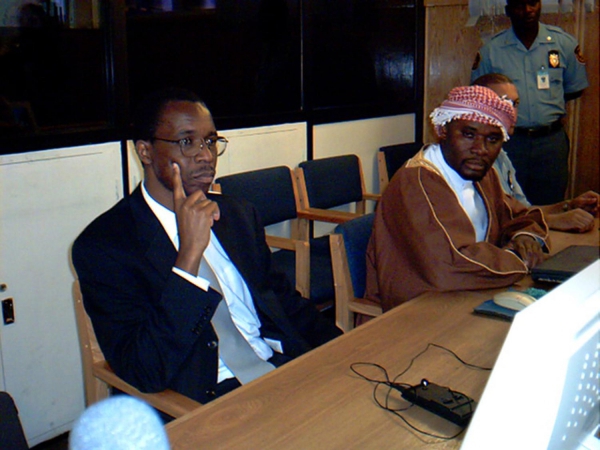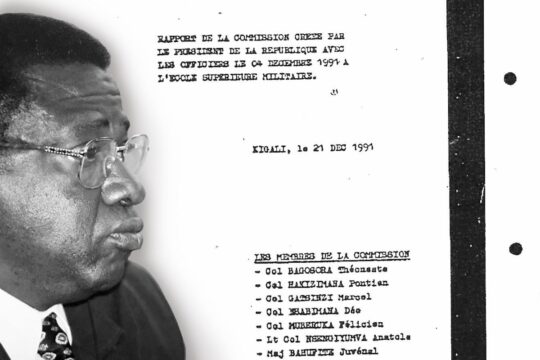Historian Ferdinand Nahimana and Father Emmanuel Rukundo, who are among the most well-known convicts of the UN’s International Criminal Tribunal for Rwanda (ICTR), could not have asked for more. They will start 2017 as free men. In two separate decisions of December 5, published Wednesday on the website of the Mechanism for International Criminal Tribunals (MICT), Judge Theodor Meron approved their request for early release.
Ferdinand Nahimana and Father Emmanuel Rukundo, who were sentenced to 30 and 23 years respectively, have been held in Koulikoro, Mali, under an agreement between the UN and West African countries.
“While the crimes of which Nahimana was convicted are very grave, the fact that Nahimana already completed two-thirds of his sentence as of 27 March 2016, and the fact that he has demonstrated some signs of rehabilitation weigh in favour of his early release”, said the MICT president. “For the foregoing reasons, I hereby grant the Application”.
It was for the same reasons that the American judge decided to approve the early release of Father Emmanuel Rukundo, who was a military pastor in northern Rwanda.
These two decisions take to 10 the number of people granted early release out of the 61 convicted by the ICTR. The sentence reductions are criticized in Kigali where some people see them as minimizing the genocide perpetrated against Tutsis in 1994.
Judge Meron was guided in his decisions, as in previous ones, by the desire to harmonize with the practices of the International Criminal Tribunal for the former Yugoslavia (ICTY), where convicts are eligible for early release after they have served two-thirds of their sentence. Meron also cited the reports of Malian prison authorities which stress the exemplary behaviour of the two convicts during their detention.
Nahimana, a former history professor at the National University of Rwanda, was a member of the steering committee behind the creation of Radio-télévision libre des mille collines (RTLM), the notorious radio that broadcast hate speech and incitements to violence before and during the genocide that took place from April to July 1994.
Nahimana, who also has a history doctorate from the University of Paris VII-Jussieu, was arrested in Cameroon in March 1996. He was sentenced to life in prison on December 3, 2003, after being found guilty of conspiracy to commit genocide, genocide, direct and public incitement to commit genocide, as well as persecution and extermination as crimes against humanity.
In their conclusions, the trial court judges found it had been proven beyond reasonable doubt that there was a “conspiracy to commit genocide” between Nahimana and his two co-accused, and between their media.
The former history professor, who was born in 1950 in northern Rwanda, was tried jointly with Jean-Bosco Barayagwiza – another founder of RTLM – and Hassan Ngeze, ex-director of the newspaper Kangura.
Conspiracy conviction thrown out on appeal
The Appeals Court, in its decision of November 28, 2007, threw out some of the findings of the lower court, including Nahimana’s conviction for conspiracy to commit genocide.
The appeals judges deemed Nahimana criminally responsible only for not having used his de facto authority over RTLM staff to prevent or stop the broadcast of programmes inciting hatred of Tutsis after the assassination of Hutu president Juvénal Habyarimana on April 6, 1994.
As a consequence, they reduced his sentence to 30 years in jail.
During his trial, Nahimana recognized the genocidal excesses of RTLM after April 6, 1994, but insisted he had no control, either in reality or under the law, over the radio, which had its own management, according to him.
As for Father Emmanuel Rukundo, he was sentenced by the trial court to 25 years in jail, after being found guilty of genocide, extermination and murder. The Appeals Court confirmed most of the judgment but found the lower court judges had made minor errors. They therefore reduced his sentence from 25 to 23 years in prison.
According to the decision, the former military pastor helped and encouraged the kidnapping and massacres of Tutsis who sought refuge at the College of Saint Joseph and Saint Léon Seminary, both in Kabgayi, central Rwanda.
The Catholic priest, born in 1959 in central Rwanda, was arrested in Geneva, Switzerland, on July 12, 2001.






